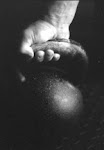A day ago, new research was reported that said "Post-exercise Caffeine Helps Muscles Refuel" - from ScienceDaily (July 2, 2008)
Here's a summary of the findings:
Glucose and insulin levels higher with caffeine ingestion
The researchers found the following:
* one hour after exercise, muscle glycogen levels had replenished to the same extent whether or not the athlete had the drink containing carbohydrate and caffeine or carbohydrate only
* four hours after exercise, the drink containing caffeine resulted in 66% higher glycogen levels compared to the carbohydrate-only drink
* throughout the four-hour recovery period, the caffeinated drink resulted in higher levels of blood glucose and plasma insulin
* several signaling proteins believed to play a role in glucose transport into the muscle were elevated to a greater extent after the athletes ingested the carbohydrate-plus-caffeine drink, compared to the carbohydrate-only drink
Dr. Hawley said it is not yet clear how caffeine aids in facilitating glucose uptake from the blood into the muscles. However, the higher circulating blood glucose and plasma insulin levels were likely to be a factor. In addition, caffeine may increase the activity of several signaling enzymes, including the calcium-dependent protein kinase and protein kinase B (also called Akt), which have roles in muscle glucose uptake during and after exercise.
Now, as we've talked about before, workouts - heavy resistance, intense intervals, loooong (90min+ ) runs, deplete that fuel, the muscle glycogen, from the muscles. So getting that fuel back into the muscles effectively is a good an important thing. Insulin is a hormone that plays an important role in this work. So caffeine sounds like it could be a Good Thing.
Well, there are issues: the study used a big dose of caffeine and researchers say their next step is to check out smaller increments:
However, because caffeine can have potentially negative effects, such as disturbing sleep or causing jitteriness, the next step is to determine whether smaller doses could accomplish the same goal.
Hawley pointed out that the responses to caffeine ingestion vary widely between individuals. Indeed, while several of the athletes in the study said they had a difficult time sleeping the night after the trial in which they ingested caffeine (8 mg per kilogram of body weight, the equivalent of drinking 5-6 cups of strong coffee), several others fell asleep during the recovery period and reported no adverse effects.
The nutrition/recovery guru Dr. John Berardi posted this article on the Precision Nutrition Forum yesterday, so i asked him, given the above research, what should one be recommending to their athletes? and this is where context comes in. Here's JMB's reply:
Carbs + protein increase glycogen recovery by about 40% over 6 hours (vs carbs alone). So I'd say that the high dose caffeine isn't necessary. Just do carbs+protein.
Hence context: while one thing sounds like it's really great (despite the side effects), there may well be other strategies that are near as effective, based on good nutrition, without the side effects. A similar kind of issue has come up with different types of creatine: take this type rather than that because it digests faster (and costs more). Sounds good, right? but actually one takes creatine AFTER a workout for the NEXT workout, so rapid digestion really doesn't matter. As the ING commercials in Canada used to say "so save your money."
And if you want good recovery after an intense workout, take a protein/carb mix. For workouts in the gym that's usually 2:1(carbs/protein) (ref); for long endurance work that's usually 4:1 (ref).







